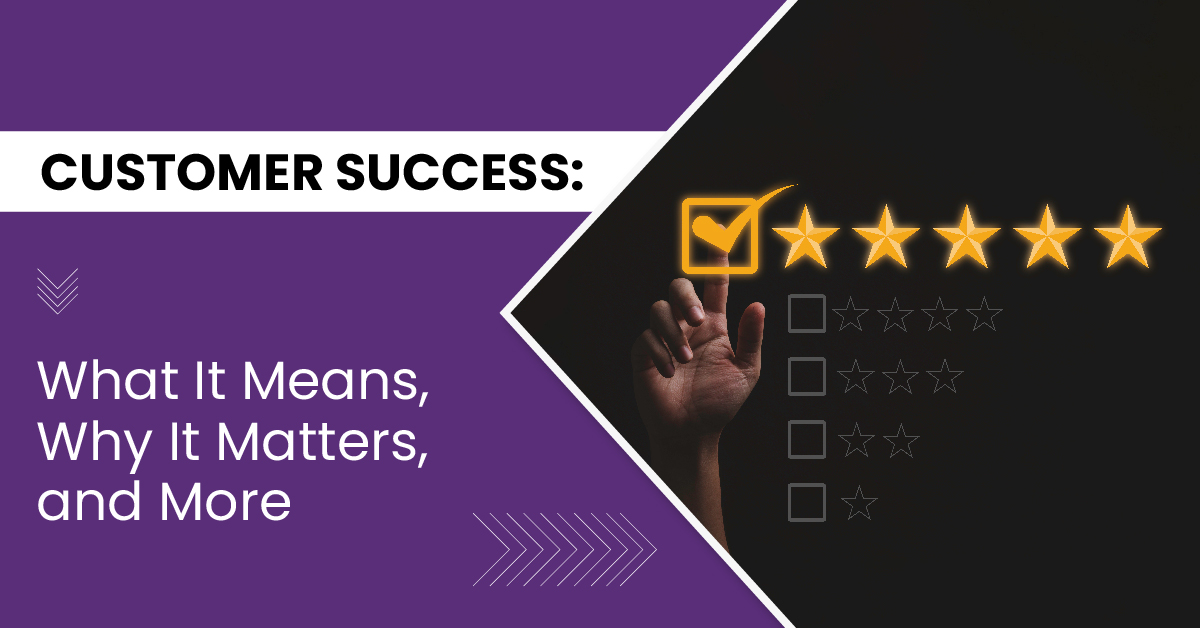Happy Customers = Growing Business . It’s as simple as that.
For small businesses and startups, customer success is not just a strategy; it’s a matter of survival. When customers succeed, so does your brand. Customer success is not about closing the sale and walking away; it’s about creating lifelong relationships.
Customer success is proactive, personal, and powerful. If done right, it adds value to an existing customer so that one-time customers will become enthusiastic advocates in-funnel.
Let’s dig in and figure out how you will create a customer success strategy to build a better business.
What is Customer Success?
Customer success is about making sure your customers achieve real, positive outcomes with your product or service. It involves you knowing their goals and understanding their challenges, and being there with solutions even before they ask.
To achieve customer success, businesses must focus on building strong relationships with their customers. This can be achieved by providing exceptional customer service and ongoing support throughout the customer journey. By understanding the unique needs of each customer, businesses can personalize their approach and provide tailored solutions that meet individual requirements.
Moreover, monitoring key metrics such as churn rate, renewal rate, and customer satisfaction scores can help businesses identify areas for improvement and refine their customer success strategies accordingly. By prioritizing the success of their customers, businesses can establish themselves as trusted partners and foster long-term relationships that drive business growth and revenue.
Why Should Small Businesses Invest in Customer Success?
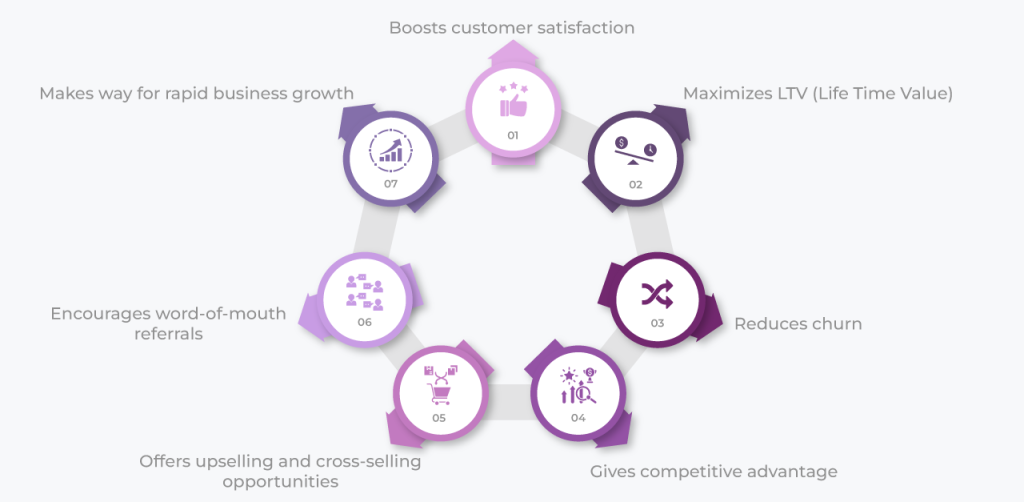
A strong customer success strategy can differentiate a company from competitors and enhance its reputation. Let’s understand its importance in detail:
Boosts Customer Satisfaction:
Customer success plays a critical role in enhancing customer satisfaction and loyalty. By understanding customer needs and providing personalized support, businesses can ensure that their customers are satisfied with the products or services they receive.
Satisfied customers are more likely to remain loyal to a brand, make repeat purchases, and even promote it to others.
Maximizes LTV (Lifetime Value):
Customer success also helps businesses maximize the value they provide to their customers. By continuously monitoring and analyzing customer data, businesses can identify opportunities to enhance their offerings or develop new solutions that align with customer needs.
This not only adds value for the customer but also increases the overall revenue potential for the business.
Reduces Churn:
Churn rate, or the rate at which customers stop using a product or service, is a common challenge for businesses. However, by implementing a strong customer success strategy, businesses can proactively address customer issues and concerns, reducing the likelihood of churn.
By providing ongoing support, personalized solutions, and proactive communication, businesses can increase customer satisfaction and minimize attrition.
Gives a Competitive Advantage:
A strong customer success strategy can set a company apart from its competitors and build a positive reputation. When businesses prioritize the success of their customers, they demonstrate their commitment to providing exceptional service and support.
This dedication establishes trust and credibility, making customers more likely to choose them over other options in the market. By consistently delivering on their promises and exceeding customer expectations, businesses can create a reputation for excellence that attracts new customers and retains existing ones.
Offers Upselling and Cross-Selling Opportunities:
Engaged and satisfied customers are receptive to upsell and cross-sell opportunities. Customer success strategies help identify appropriate moments to present additional services or upgrades, maximizing revenue potential.
Encourages Word-of-Mouth Referrals:
Delighted customers become brand advocates, sharing their positive experiences with others. Word-of-mouth referrals generated through exceptional customer success efforts can significantly expand your customer acquisition at a low cost.
Makes Way for Rapid Business Growth:
Customer success is not just about keeping existing customers satisfied; it also plays a key role in driving business growth. When businesses focus on customer success, they are more likely to see an increase in revenue and profitability. Satisfied customers are not only more likely to make repeat purchases, but they are also more likely to spend more on each transaction.
By providing personalized support and meeting customer needs, businesses can upsell or cross-sell additional products or services, driving up their average order value.
Customer Success vs. Customer Service vs. Customer Experience
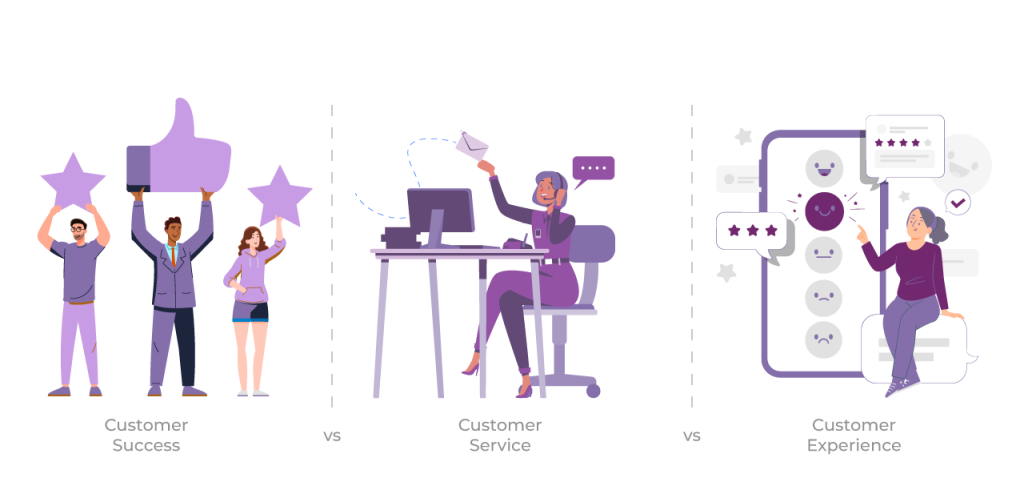
Understanding the differences between customer success, customer service, and customer experience is crucial in delivering exceptional outcomes.
Customer success is about managing accounts proactively to achieve customer satisfaction. It aims to drive positive outcomes for customers. In contrast, customer service responds reactively to issues when they arise.
Improving customer experience means enhancing all interactions between a brand and its customers. This includes every step from first-time discovery to help after a purchase. By doing this, businesses can make their brand look great, inspire loyalty, and keep more customers for longer.
By complementing and enhancing customer service and experience, customer success ensures long-term business success and fosters loyal brand advocates.
Customer Success vs. Account Management
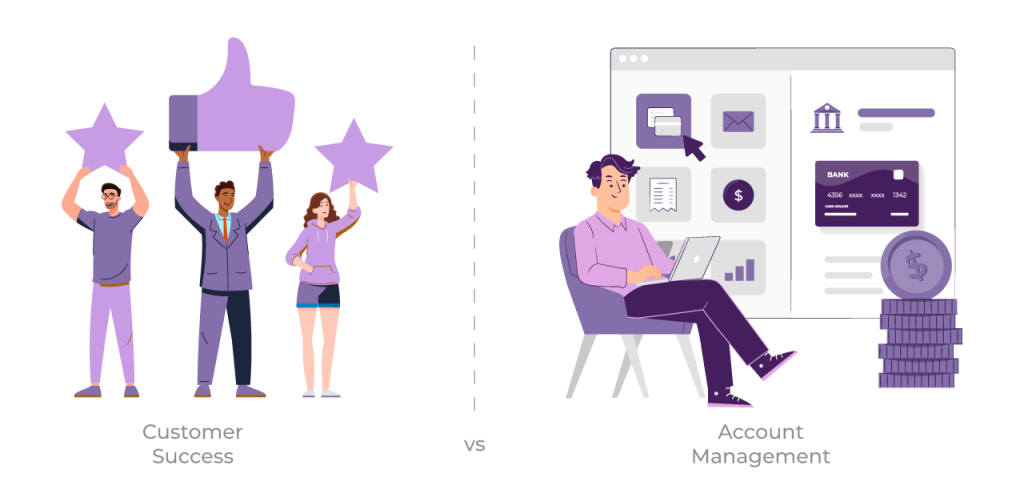
While customer success and account management both play crucial roles in ensuring customer satisfaction, they have distinct focuses.
Customer success is centered around driving the long-term success and satisfaction of customers by proactively driving positive outcomes.
On the other hand, account management primarily focuses on managing the relationships and needs of individual customers, addressing their immediate needs, and resolving issues as they arise. By going beyond account management, customer success aims to maximize customer satisfaction, retention, and lifetime value.
Best Customer Success Strategy for a Small Business: A Step-by-Step Process
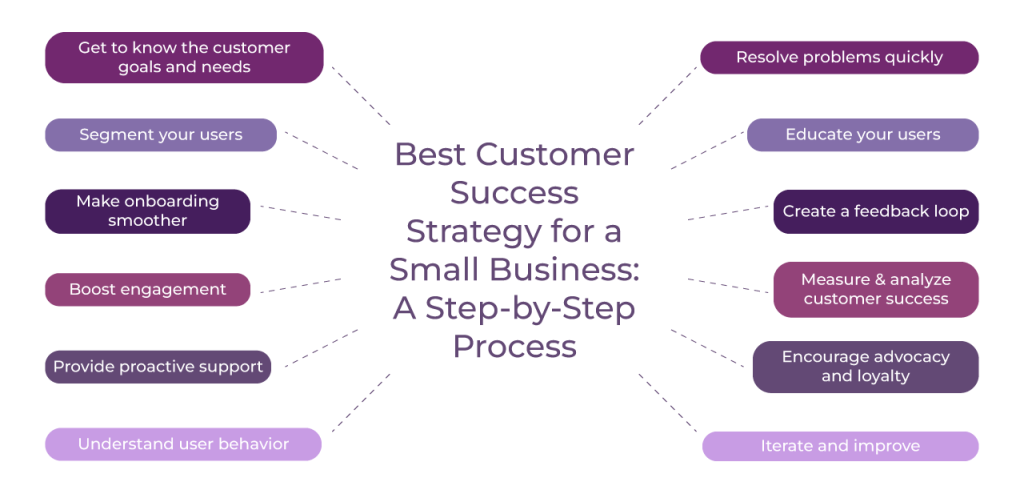
Get to Know the Customer Goals and Needs:
Start by comprehensively understanding your customer’s business objectives, challenges, and expectations. Conduct surveys, interviews, or analyze past interactions to gather this crucial information.
Segment Your Users:
Categorize customers based on their goals, industry, size, and usage patterns. Creating customer personas helps tailor strategies and communication to specific segments effectively.
Make Onboarding Smoother:
Develop customized onboarding plans to help customers get started with your product or service. Provide clear instructions, tutorials, and support to ensure a smooth and successful adoption.
Boost Engagement:
Maintain regular communication with customers to gauge their satisfaction, offer assistance, and gather feedback. This engagement fosters a strong relationship and helps identify potential issues early on.
Provide Proactive Support:
Anticipate customer needs and offer proactive support before they encounter problems. Share best practices, provide tips, and offer guidance to enhance their experience.
Understand User Behavior:
Utilize customer success software to track product usage and behavior patterns. Analyze this data to identify areas for improvement and opportunities to guide customers effectively.
Resolve Problems Quickly:
Act swiftly to address any customer concerns or challenges they encounter. Provide personalized solutions and ensure that their issues are resolved promptly.
Educate Your Users:
Offer training sessions, webinars, or educational resources to enhance customers’ understanding and utilization of your product or service. Knowledgeable customers are more likely to succeed.
Create a Feedback Loop:
Regularly solicit feedback from customers regarding their experiences, pain points, and suggestions for improvement. Implement necessary changes based on this feedback to enhance the product/service.
Measure & Analyze Customer Success:
Establish key performance indicators (KPIs) to measure the effectiveness of your customer success efforts. Evaluate metrics such as customer satisfaction, retention rates, and lifetime value to continuously refine your strategies.
Encourage Advocacy and Loyalty:
Encourage satisfied customers to become advocates by providing referrals, testimonials, or case studies. Reward and recognize loyal customers to foster a long-term relationship and drive brand loyalty.
Iterate and Improve:
Continuously assess your customer success processes and strategies. Iterate and improve based on learnings, changing customer needs, and emerging industry trends to ensure sustained success and growth.
By following these steps and maintaining a customer-centric approach, you can effectively manage customer success and drive meaningful outcomes for both your customers and your business.
Key Responsibilities of a Customer Success Team
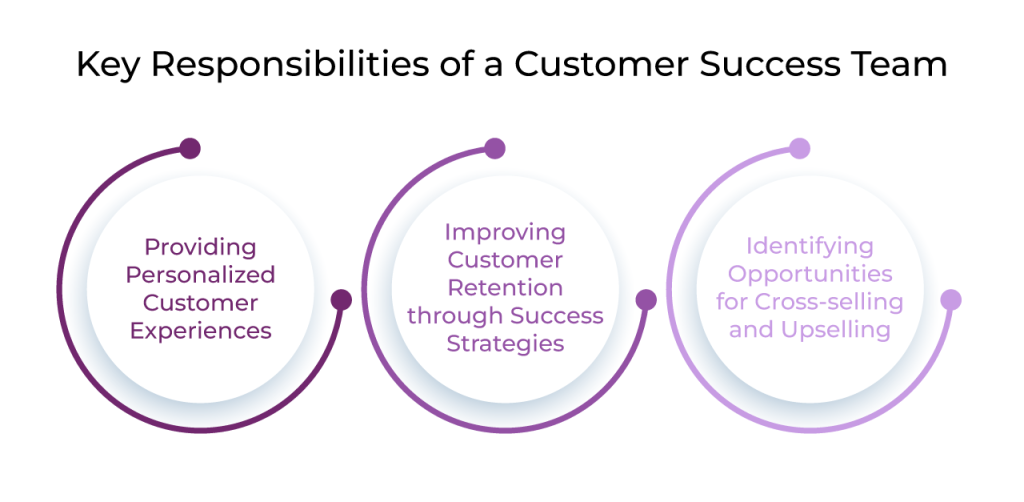
Providing Personalized Customer Experiences
Understanding the unique needs and expectations of each customer is crucial. By tailoring solutions to meet individual requirements, you can create a better experience. To exceed customer expectations, offer proactive support and guidance throughout their journey.
Regularly communicate and update customers on relevant information for ongoing value. Going the extra mile establishes your business as a trusted partner and builds brand advocates. By providing personalized customer experiences, you can foster long-term loyalty and drive business success.
Improving Customer Retention through Success Strategies
Improving customer retention is crucial for long-term business success. One of the best ways to achieve this is by implementing success strategies that prioritize customer satisfaction and ongoing value. By monitoring and analyzing customer usage and activity, you can identify red flags and proactively reach out to at-risk customers.
Offering value-added services and demonstrating the continuous value of your product or service ensures a better experience for your customers and helps in building brand advocates. With a dedicated customer success team and the right tools, you can improve customer retention and drive major growth for your business.
Identifying Opportunities for Cross-Selling and Upselling
To identify opportunities for cross-selling and upselling, it’s important to understand the customer’s needs and pain points. By doing so, you can identify relevant products or services that complement their existing solution. Educating customers on the benefits of additional offerings is a great way to showcase the value your business provides.
Additionally, providing personalized recommendations based on their usage and goals can help build long-term partnerships and maximize customer lifetime value. By focusing on these strategies, you can effectively identify and leverage opportunities for cross-selling and upselling.
Frequently Asked Questions
Who Needs a Customer Success Strategy?
To prioritize customer satisfaction and long-term success, any business should have a customer success strategy. Start-ups, SaaS companies, and businesses with complex products can benefit from proactive customer management.
Companies struggling with churn rates or customer satisfaction should consider implementing a customer success strategy. Organizations aiming to improve the overall customer journey can also benefit from customer success.
How Do I Win the Hearts of Customers?
To win the hearts of customers, it’s crucial to listen to their needs and concerns. Provide exceptional customer service by responding promptly to inquiries. Offer personalized solutions that cater to their specific preferences. Continuously gather feedback to improve the customer experience.
What Is Virtual Customer Service?
Virtual customer service refers to providing support through digital channels like chat, email, or video calls. It eliminates the need for physical visits or phone calls, making it more convenient for customers.
Many companies are adopting this approach to enhance their support offerings and reduce costs. Engaging with customers digitally can foster long-term relationships.
What Is Customer Intelligence?
Customer intelligence refers to the gathering of information about customer behavior, preferences, and needs to enhance the customer experience. It helps companies gain a better understanding of their customers and deliver personalized experiences.
By collecting data from various sources like social media and surveys, companies can make informed decisions that lead to increased customer satisfaction and retention.
What Is the Best Customer Support Tool for an Enterprise?
There are several excellent customer support tools available for enterprises, such as Zendesk, Freshdesk, and Salesforce Service Cloud. These tools offer a range of features including ticket management, live chat, and knowledge base management.
When selecting a customer support tool for an enterprise, it’s important to consider factors like scalability, ease of use, and integration with other systems.
Is a CSM a Respected Role in Tech?
A Customer Success Manager (CSM) holds a highly respected position in the tech industry. Their role is crucial for ensuring customer satisfaction and retention. CSMs build strong client relationships, focusing on their success with the product or service.
Experienced and skilled CSMs are often sought after to maintain customer loyalty and drive business growth.
How Do You Measure the Effectiveness of a Customer Success Program?
Measuring the effectiveness of a customer success program can be done in several ways. Tracking customer retention rates is one indicator, while surveys or feedback forms can gauge customer satisfaction. The number of upsells and cross-sells can also reveal program success.
Establishing clear goals and metrics upfront helps measure impact.
What Is Customer Success in SaaS?
Customer success in SaaS (Software as a Service) ensures that customers achieve their desired outcomes with the software. It involves a proactive approach to overcome obstacles and maximize value. Customer success teams work closely with customers, providing support and measuring satisfaction.
By focusing on customer success, SaaS companies improve retention and build long-term relationships.
Make Design Shifu a Part of Your Team and Achieve Customer Success
Customer success is largely determined by your communication channels. The look and feel of your social media accounts, website, ads, and other avenues are vital to build a brand image and recall.
Providing a seamless experience, timely assistance, and exceeding customer expectations are crucial factors in nurturing a successful customer journey.
At Design Shifu, we prioritize ensuring you achieve optimal value from our services. We believe that a dedicated team of design experts, working closely with you, can make all the difference in realizing your design objectives while staying within your budget.
Discover how our tailored design solutions can revolutionize your brand’s visuals and elevate your success. With Design Shifu, you have a committed partner to assist you in achieving your design goals effectively and efficiently, ensuring your business’s long-term success and growth.
Book a Demo with Design Shifu Today and Bring a Design Partner on Board.

